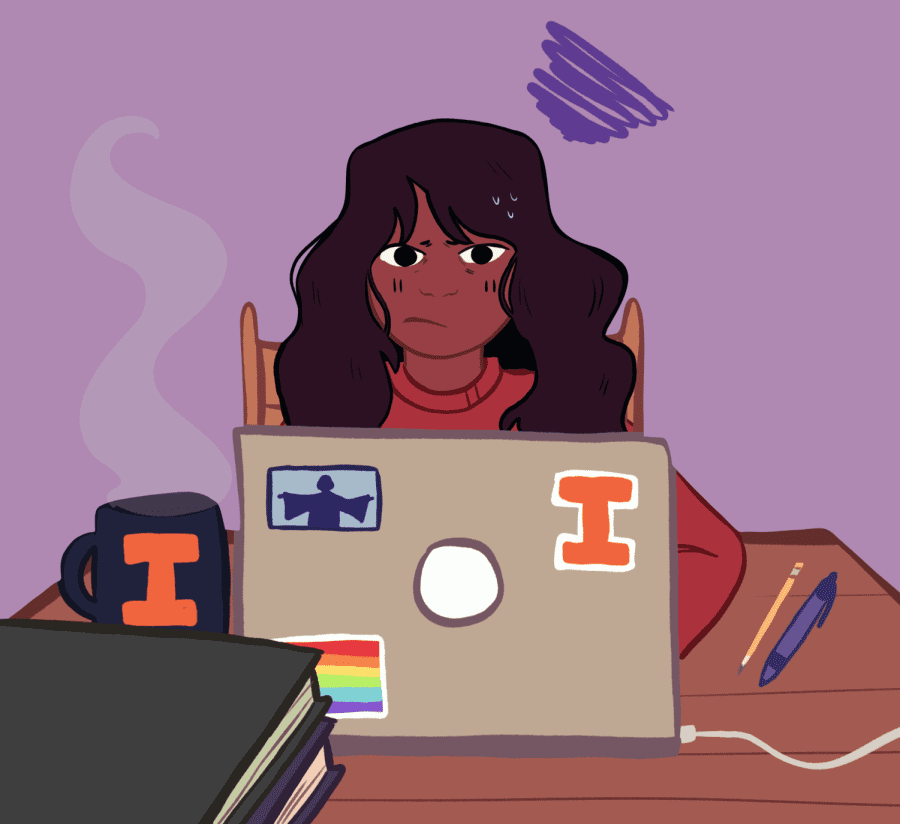Healthy habits, connections ease academic transition
July 15, 2022
College academics can quickly become a beast to tackle as soon as one steps into a college classroom for the first time. The sheer size of the room, the number of other students searching for seats and the professor preparing for lecture — any one of these factors can make the first day (or even first week) of classes feel overwhelming.
Maggie Katsoudas, senior in LAS, acknowledged having a similar feeling when she stepped into her first class freshman year. She described how that feeling quickly disappeared.
“I know that I was very intimidated going in because my first class was a big lecture hall in Gregory Hall,” Katsoudas said. “It was not as bad as I expected.”
Katsoudas noted that many professors understand the nerves that accompany attending a college class for the first time. She cited a moment when her professor made the new students feel welcome.
“My professor was literally like, ‘So who here is a freshman? Whose first class is this?’” Katsoudas said. “I saw a bunch of other people raising their hand, so that’s really nice. I think … the main thing is remembering that you’re not the only one doing this.”
Get The Daily Illini in your inbox!
When considering the differences between high school academics and college academics, Katsoudas emphasized the need for larger time commitments for college academics since students need to do more work outside of lectures, discussions and labs to be fully prepared for every class.
Jessi Kim, an academic advisor and engineering undeclared program coordinator, discussed the variability of schedules in college compared to high school and its effects on freshmen student learning and habits.
“In high school, you’re meeting every day,” Kim said. “In college, it’s a little bit different. One day, you’re meeting in the lecture. The next day, you’re meeting in discussion, and sometimes you’re only meeting once or twice a week, so it’s easy to kind of forget what you learned that week if you aren’t consistent with reviewing every day.”
Katsoudas spoke about the importance of the relationship between students and professors, noting that professors want students to succeed and are very open to connecting with them.
“When I was dealing with a lot of burnout last semester, I reached out to a few of my professors, and they were very understanding and accommodating,” Katsoudas said. “They are really nice and fun to talk to, and especially if it’s a class where you have a lot of interest, conversation doesn’t have to only be about that class.”
Kim added that the connections between students and their advisors can be impactful as well.
“I think the advisor role really is to be resourceful for the student and to point them to utilizing the resources that will hopefully improve the student experience here on campus,” Kim said. “That might mean going to the Office of the Dean of Students or finding support through McKinley or the Counseling Center but also just in that one meeting, that 30-minute session, (showing) the student that they are important (and) that we care.”
After discussing how her professors were empathetic regarding her burnout, Katsoudas shared a practice that has helped her tackle burnout.
“Something that I found that really helped me was taking things one at a time rather than looking at the big picture,” Katsoudas said. “If I can get one thing done, then I will be happy with myself for a second, you know, and just kind of like doing little rewards.”
Kimberly Powers, academic advisor in LAS, acknowledged there are different reasons that students might experience burnout and imposter syndrome. She stressed the importance of having strong support in addressing both.
“Be around people who constantly reaffirm that (you) belong,” Powers said. “That’s going to be different for different people, but I think that’s what’s really valuable, and I think getting back to the very first point I made — everyone worked really hard to get here.”
Calen Gutwein, academic advisor in DGS, also offered advice that applies to tackling imposter syndrome, highlighting how students have their own unique skill sets, interests, talents and strengths.
“I really, truly believe that everyone has different gifts and talents and passions and how are we going to use those during the life that we have?” Gutwein said. “And so that is the foundation — coming not from a deficit perspective but from a strength perspective.”
Since the very first day of her freshman year, Katsoudas has continually developed her talents and pursued her passions. She has become president of University RSO Girl Up and an editor and social media manager of Montage Arts Journal alongside her studies.
When it comes to balancing her studies with other aspects of college, Katsoudas seeks to blend the academic and social aspects whenever possible, such as holding study sessions with friends.
Katsoudas highly recommended that freshmen participate in Quad Day to discover organizations to join and to continue exploring various organizations through the Involved@Illinois website, mentioning that this exploration led her to finding Montage Arts Journal.
When reflecting on one final piece of academic advice she would want to offer incoming students, Katsoudas focused on the idea of understanding one’s work habits and preferences and how they might lead to exploring more of campus.
“I definitely think that you need to learn how you work first,” Katsoudas said. “It took some trial and error, but now, I kind of understand that I’m somebody who needs to work in a public place and see other people working, so then I know like, ‘OK, I’ve got to get stuff done.’ It’s also a good excuse to explore campus because there are so many places to study … There are a lot of different places that you could go.”







